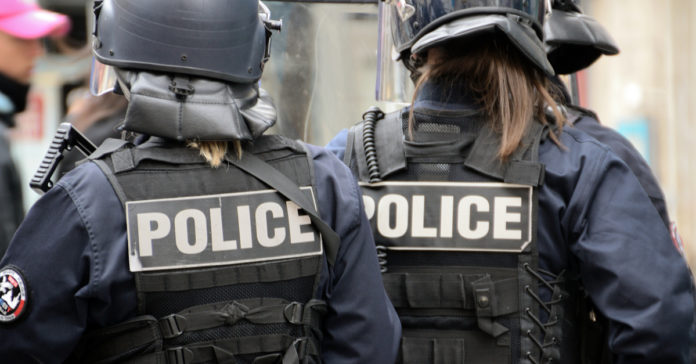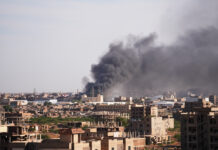Human Rights Watch has slammed the French police for its use of stop-and-frisk powers to conduct discriminatory and abusive checks on Black and Arab boys and men.
Curbing these powers is key to addressing biased policing, including racial or ethnic profiling, and repairing police-community relations, the organisation said.
A new HRW report, “‘They Talk to Us Like We’re Dogs’: Abusive Police Stops in France,” documents repetitive, baseless police stops targeting minorities including children as young as 10, older children, and adults.
These stops often involve invasive, humiliating body pat-downs and searches of personal belongings. Most stops are never recorded, the police don’t provide written documentation or usually tell people why they were stopped, and measures to improve accountability have been ineffective. Several of the children and adults interviewed said police used racial slurs.
“There is ample evidence that identity checks in France, in particular because they have a discriminatory impact, drive a deep and sharp wedge between communities and the police, while doing virtually nothing to deter or detect crime,” said Bénédicte Jeannerod, France director at Human Rights Watch. “The authorities shouldn’t keep ignoring the calls for change.”
Human Rights Watch interviewed 90 French men and boys belonging to minority groups, including 48 children, between April 2019 and May 2020 in Paris, Grenoble, Strasbourg, and Lille.
Many said they were stopped because of what they look like and where they live, not their behaviour. Ethnic profiling – stopping people based on appearance, including race and ethnicity, rather than the person’s behaviour or a reasonable suspicion of wrongdoing – is unlawful.
Subscribe to our newsletter and stay updated on the latest news and updates from around the Muslim world!
Yet Human Rights Watch found that police often target minority youth, including young children, for the stops. Children as young as 12 described being forced to put their hands against a wall or car, spread their legs, and submit to invasive pat-downs, including buttocks and genitalia. These stops can take place in front of or near schools, and on school field trips.
Testimonies
“Koffi,” 12, said he and his entire class were subjected to a police identity check in front of their middle school in Bobigny, outside Paris, as they were leaving on a field trip to the Louvre. He said three police officers searched all of their bags. “They put their hands in my pockets. They spread my legs and touched my genitals,” Koffi said, adding that his teacher objected but the police said they could do whatever they wanted.
“Sekou,” a 14-year-old living in the 11th arrondissement of Paris, said he’d been stopped at least 6 times. “We never see white kids getting checked,” he said. “When I’m with my white friends, the police don’t even look at them…. They say ‘freedom, equality, fraternity,’ but there’s no equality when it comes to this kind of thing.”
Abusive and discriminatory identity checks are a longstanding problem in France and are at the heart of concerns around institutional racism and discrimination, Human Rights Watch said.
Tens of thousands of people have demonstrated in France in the wake of the killing of a Black man, George Floyd, by a white policeman in Minneapolis on May 25. Many have drawn parallels to the 2016 death in police custody in a Paris suburb of 24-year-old Adama Traoré which began with an identity check.
In response to these protests, Interior Minister Christophe Castaner announced on June 8 a “zero tolerance” approach and measures to hold individual officers accountable for racist behaviour. But on identity checks, Castaner simply reminded officers of their duty to display their tag numbers and called for reinforcing the use of body cams.
In a speech to the nation on June 14, President Emmanuel Macron condemned all forms of racism but did not specifically address police abuse, saying only that law enforcement deserve “the support of public authorities and the gratitude of the nation.”
While the authorities have consistently rejected calls to collect and publish statistics about police stops, data released about stops to enforce lockdown measures amid the Covid-19 pandemic showed a bias involving minorities in poor neighborhoods.
In late April, government statistics showed that police had conducted more than double the national average of stops in Seine-Saint-Denis, the poorest area of metropolitan France. Numerous videos have circulated showing police stops that appear abusive, violent, and discriminatory.
Despite increased awareness and modest advances, the law and practice of identity checks in France remain deeply problematic, Human Rights Watch said. The law gives the police overly broad discretion to carry out stops without any suspicion of wrongdoing, leaving too much room for arbitrary and biased decisions.
Police protests
In recent weeks police across France have held protests to express their frustration at claims that they tolerate brutality and racism after Interior Minister Christophe Castaner announced the ban on the “chokehold” move.
Defending the police use of chokeholds, Xavier Leveau of the police union told the AFP news agency that “head restraint is very important during handcuffing”. He insisted it was nothing like the method used in the death of George Floyd.
He went on: “We are angry at the announcements that are made, where we suspect the police of everything and nothing, whereas in our country the police really reflect the image of its population.
“People think that the police are racist, whereas in our country we have people of all ethnic groups, and we all work well together.”
France’s police watchdog says it received almost 1,500 complaints against officers last year – half of them for alleged violence.




















